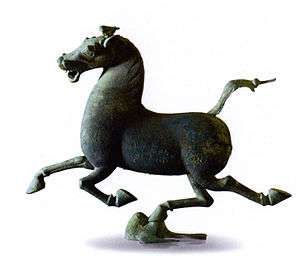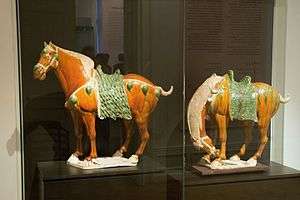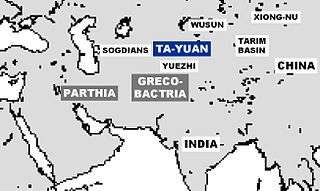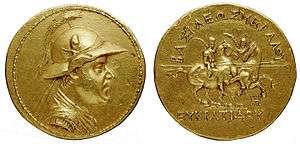Ferghana horse

Ferghana horses (Chinese: 大宛馬 / 宛馬; pinyin: dàyuānmǎ / yuānmǎ; Wade–Giles: ta-yüan-ma / yüan-ma) were one of China's earliest major imports, originating in an area in Central Asia. These horses, as depicted in Tang dynasty tomb figures in earthenware, "resemble the animals on the golden medal of Eucratides, King of Bactria (Bibliothèque Nationale in Paris)."[1]


Ancient history
Dayuan, north of Bactria, was a nation centered in the Ferghana Valley of present-day Central Asia, and even as early as the Han dynasty, China projected its military power to that area. The Han imperial regime required Ferghana horses and imported such great numbers of them that the rulers of Ferghana closed their borders to such trade. That move resulted in a war that China won. In 102 CE, the Chinese required of the defeated Ferghana that they provide at least ten of their finest horses for breeding purposes, and three thousand Ferghana horses of ordinary quality.[2] However, there are other views: the Records of the Grand Historian and Book of Han provide no description of Ferghana horses, and as it seemed from these chronicles they were not employed in any known Han expeditions and campaigns.
Chinese statuary and paintings, as well as the Bactrian coin shown above, indicate that these horses had legs that were proportionally short, powerful crests, and round barrels. The forelegs of the Chinese depictions are very straight, resembling the Guoxia (Chinese: 果下; pinyin: gǔoxìa; Wade–Giles: kuo3 hsia4; literally: "under the fruit [trees]") horse of present-day China. According to tradition, these horses sweat blood, giving rise to the name: "sweats blood horse" (in Chinese: 汗血馬; pinyin: hànxuèmǎ). Modern authorities believe that blood-sucking parasites caused sweat to get mixed with blood when the horses were worked.
'“Modern researchers, Mair notes, have come up with two different ideas [for the ancient Chinese references to the “Blood-sweating” horses of Ferghana]. The first suggests that small subcutaneous blood vessels burst as the horses sustained a long hard gallop. The second theorizes that a parasitic nematode, Parafilaria multipapillosa, triggered the phenomenon. P. multipapillosa is widely distributed across the Russian steppes and makes its living by burrowing into the subcutaneous tissues of horses. The resulting skin nodules bleed often, sometimes copiously, giving rise to a something veterinarians call “summer bleeding.”[3]

Over 2,000 years ago two Chinese armies traveled 10,000 km to Ferghana to find ‘Heavenly Horses’, the finest mounts then known, apparently infected with a tiny worm causing them to ‘sweat blood’ from skin sores:
"Sometime earlier the emperor had divined by the Book of Changes and been told that "divine horses are due to appear" from the northwest". When the Wusun came with their horses, which were of an excellent breed, he named them "heavenly horses". Later, however, he obtained the blood-sweating horses from Dayuan [= Ferghana], which were even hardier. He therefore changed the name of the Wusun horses, calling them "horses from the western extremity", and used the name "heavenly horses" for the horses of Dayuan."[4]
P. multipapillosa is thought to have been the cause of the "blood-sweating" of these famous and much desired horses from Ferghana, which Emperor Wu of Han China (Wudi) renamed "Heavenly Horses" (c. 113 BCE). He sent an army of 40,000 men in 104 BCE 5,000 km to Ferghana, but they were defeated. Another army of 60,000 men was sent in 103 BCE and they managed to negotiate the acquisition of 3,000 horses (though only a few dozen were top class and only 1,000 made it all the way back to China in 101 BCE). However, they did also get an agreement that Ferghana would send two Heavenly horses each year to the Emperor, and lucerne seed was brought back to China providing superior pasture for breeding raising fine horses in China, to provide cavalry which could cope with the Xiongnu who threatened China.[5][6]
The Han dynasty bronze statuette Gansu Flying Horse is most likely a depiction of this breed.[7]
See also
| Wikimedia Commons has media related to Ferghana horse. |
Footnotes
- ↑ See p. 39 of Lida L. Fleitmann's, The Horse in Art, William Farquhar Payson (publishing company), New York, 1931.
- ↑ Fleitmann, p. 39
- ↑ The Emperor and the Parasite. The Last Word On Nothing (2011-03-03). Retrieved on 2011-03-17.
- ↑ Shiji 123 in Watson (1961), p. 240.
- ↑ Watson (1961), p. 135.
- ↑ Boulnois (2004), pp. 82–83.
- ↑ Silk Road Foundation
References
- Bonavia (2004): The Silk Road From Xi’an to Kashgar. Judy Bonavia – revised by Christoph Baumer. 2004. Odyssey Publications. ISBN 962-217-741-7.
- Boulnois (2004): Silk Road: Monks, Warriors & Merchants on the Silk Road. Luce Boulnois. Translated by Helen Loveday. Odyssey Books, Hong Kong. ISBN 962-217-720-4.
- Forbes, Andrew ; Henley, David (2011). 'The Heavenly Horses of the West' in: China's Ancient Tea Horse Road. Chiang Mai: Cognoscenti Books. ASIN: B005DQV7Q2
- Watson, Burton, translator. (1961). Records of the Grand Historian by Sima Qian. Han Dynasty II (Revised Edition), Columbia University Press. ISBN 0-231-08167-7.
External links
- http://chinesehoroscop-e.com/astrology/ferghana-horses.php
- http://www.wantchinatimes.com/news-subclass-cnt.aspx?id=20110922000098&cid=1103